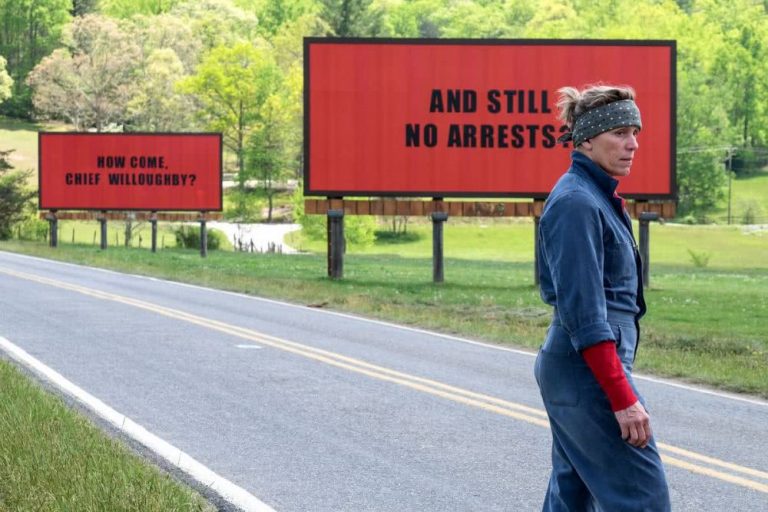An overly pessimistic Nick Cave song once opened with the lyrics, “People, they ain’t no good.” I have to disagree. In reality we know people are neither wholly good, nor simply bad – and that’s no matter what Hollywood’s pantheon of stock standard heroes and villains might try to tell us. After all, it’s when a film gracefully unpacks the flaws of messy, morally fluid human beings that a deeper and more nuanced story emerges.
Writer and director Martin McDonagh often returns to these morally ambiguous characters: his 2008 film In Bruges followed the guilt-stricken Ray (Colin Farrell), a hitman burdened with remorse after accidentally murdering a child, and in the director’s latest Southern gothic comedy-drama Three Billboards Outside Ebbing, Missouri characters are full of a similar complexity.
A result of that complexity has been the controversy that has greeted the film. Sam Rockwell’s Golden Globe-winning and Oscar-nominated portrayal of the hot-tempered police Officer Jason Dixon has drawn ire from some members of Three Billboards’ audience: Dixon is openly racist and hostile towards the towns’ African American residents, submitting them to slurs and threats, and even gains notoriety in the small community of Ebbing for torturing a person of colour in custody.
Worse still, as far as Three Bilboards’ critics are concerned, Dixon has somewhat of a redemptive arc. Dixon’s superior, Chief Bill Willoughby (Woody Harrelson), encourages the hooligan to come to the aid of grieving mother and protagonist Mildred (Frances McDormand), and while he makes amends for his treatment of white townsfolk, the same can’t be said for the folk who are subjected to his racist ideologies.
The timing of such a character arc feels particularly anachronistic, too: redemption for a character like Dixon feels like a slap in the face for some after last year’s #OscarsSoWhite campaign.
The film isn’t about good and bad, left and right. It’s just trying to find the spark of humanity in people – all people.
But, despite all that, Dixon doesn’t come out of the film looking like a hero. In fact, there are no heroes in this film. Even the grieving Mildred pushes boundaries to get her daughter’s murder solved, publically shaming police by erecting three billboards that in sequence read: “Raped while dying. And still no arrests. How come, chief Willoughby?”
“I don’t think I redeem [Dixon], or forgive him, or try to make him a hero because the point is that there are no heroes or villains,” explained McDonagh to The Guardian. “The film isn’t about good and bad, left and right. It’s just trying to find the spark of humanity in people – all people.”
That selfsame spark is similarly under examination in I, Tonya, also out in Australian cinemas now. The brash and outspoken ’90s figure skater Tonya Harding (portrayed by Margot Robbie, perfectly cast) explains to the audience that she was stigmatised by US Olympic officials who disliked her bulky, unfeminine trailer-trash image – an image that only worsened after her suspected attack on rival Nancy Kerrigan, a skater who had the gentle swan-like skater aesthetic that said American officials unequivocally desired of their skaters.
https://www.youtube.com/watch?v=OXZQ5DfSAAc
I, Tonya makes the case that Harding was much more than the person she was portrayed in the media. Each character in the film proves to be an unreliable narrator, with the story changing each time a new side of the tale is presented, and although Harding believes herself to be the victim, her pushy, chain-smoking mother argues she’s ungrateful and rude.
Indeed, every single character moves from wholesome to demonic, and leaves the audience to navigate through a distinct moral haziness. Harding herself compounds this haziness: “There’s no such thing as truth,” she barks at one point, glaring at the camera. “Everyone has their own truth”.
I, Tonya has an advantage over Three Billboards in that it’s based on true events and draws on multiple points of view to nail Harding’s contradictions, and her complexity.
And yet that McDonagh created such complex characters out of thin air is impressive – his film could have easily been a flop, submitting to the haphazardness that defined the P.T. Barnum-centred musical-biopic The Greatest Showman, a film that completely failed to bring its real characters to life.
After all, Showman retells the life story of Barnum (Hugh Jackman), a charismatic man with a penchant for tall tales and big dreams, and – at least as far as the film is concerned – a figure of great charity who helped outcasts find self-acceptance. It matters little to that film’s director Michael Gracey that Barnum was also downright exploitive, profiting from hoaxes at the expense of those portrayed as his friends – Gracey erases all of his hero’s flaws, leaving only a man with a big heart.
In actuality, Barnum regularly mistreated his ‘oddities’; in one case he charged an admission fee to see a public autopsy for a woman he falsely claimed to be 161 years old. And if it wasn’t for the musical sequences, Showman would be totally dulled by its flat characters – it’s a disservice to Barnum’s bizarre and morally dubious life.
No human is stagnant, nor are our journey’s fixed to the moral compass (or lack thereof) we are born with.
Ultimately, we don’t need characters to have concrete moral superiority, or to be completely hated to enjoy the material presented in front of us. In fact, we need more morally ambiguous characters to frequent the screen. No human is stagnant, nor are our journey’s fixed to the moral compass (or lack thereof) we are born with – we all grow and change, moving backwards and forwards. Seeing characters that defy our expectations is what adds colour to a narrative.
Three Billboards Outside Ebbing, Missouri and I, Tonya are out in Australian cinemas now. And if you can’t stand the wait to see these films at home, take a deep dive into what’s good on streaming services Stan and Netflix here.

































